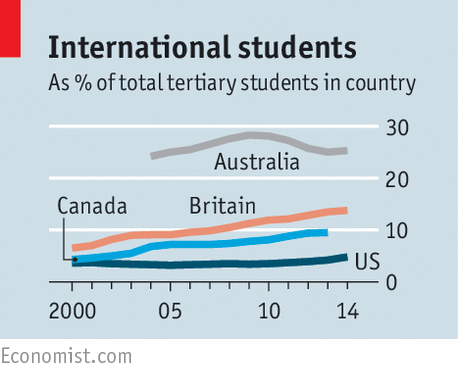Foreign students
Train 'em up. Kick 'em out
Shrewd governments welcome foreign students. Stupid ones block and expel them
Jan 30th 2016 | From the print edition
YOUNGSTERS have long crossed borders in search of an education. More than 2,000 years ago the Roman poet Horace went to Athens to join Plato's Academy. Oxford University admitted its first known international student, Emo of Friesland, in 1190. Today more than 4.5m students are enrolled in colleges and universities outside their own countries (see article). Their fees subsidise local students. Their ideas broaden and enliven classroom debate. Most go home with happy memories and valuable contacts, making them more likely in later life to do business with the country where they studied. Those who stay on use what they have learned to make themselves and their hosts wealthier, by finding work as doctors, engineers or in some other skilled career.
Immigration policy is hard: Europe is tying itself in knots over how many Syrian refugees to admit. But the question of whether to welcome foreign students ought to be much easier. They more than pay their way. They add to the host country's collective brainpower. And they are easy to assimilate. Indeed, for ageing rich countries seeking to import young workers to plug skills gaps and prop up wobbly pension systems, they are ideal. A foreign graduate from a local university is likely to be well-qualified, fluent in the local lingo and at ease with local customs. Countries should be vying to attract such people.
Canada, until recently an also-ran, now emulates Oz. In 2014 it set a goal of almost doubling the number of foreign students by 2022. It has streamlined visa applications and given international students the right to stay and work for up to three years after graduating. Those who want to make Canada their home have a good chance of being granted permanent residence. Its share of the market for footloose students is growing, and numbers have more than doubled in a decade.Places with the good fortune to speak English have a gigantic head start. Australia is the leader: a quarter of its tertiary students come from abroad, a bigger share than in any other country. Education is now its biggest export, after natural resources. For a while the influx of brainy foreigners was slowed by an overvalued currency and the reputational damage from the collapse of some badly run private colleges. But recently the Australian dollar has weakened, degree mills have been shut down, visa rules have been relaxed—and foreign students have flooded back. Last year their numbers rose by 10%.
America, by contrast, is horribly complacent. In absolute terms, it attracts the most foreign students, thanks to its size, its outstanding universities and the lure of Silicon Valley and other brainworking hotspots. But it punches far below its weight: only 5% of the students on its campuses are foreign. Its visa rules are needlessly strict and stress keeping out terrorists rather than wooing talent. It is hard for students to work, either part-time while studying or for a year or two after graduation. The government wants to extend a scheme that allows those with science and technology qualifications to stay for up to 29 months after graduating. But unions oppose it, claiming that foreign students undercut their members' wages. One that represents high-tech workers in Washington state has filed a court challenge, seeking to have the scheme axed.
The self-harming state
Britain is even more reckless. It, too, has the huge advantages of famous universities and the English language. But its government has pledged to reduce net immigration to 100,000 people a year, and to this end it is squeezing students. Applying for a student visa has grown slower and costlier. Working part-time to pay fees is harder. And foreign students no longer have the right to stay and work for two years after graduation. Britain's universities are losing market share: their foreign enrolments are flat even as their main rivals' are growing strongly.
Sajid Javid, Britain's business secretary, says the aim is to "break the link" between studying and immigration. This is precisely the wrong approach. For a country that wants to recruit talented, productive immigrants, it is hard to think of a better sifting process than a university education. Welcoming foreign students is a policy that costs less than nothing in the short term and brings huge rewards in the long term. Hence the bafflement of James Dyson, a billionaire inventor, who summed up Britain's policy thus: "Train 'em up. Kick 'em out. It's a bit shortsighted, isn't it?"
The views expressed are individual and not necessarily MTC Global also share the same views.
---
You received this message because you are subscribed to the Google Groups "Management Teachers Consortium, Global" group.
To unsubscribe from this group and stop receiving emails from it, send an email to join_mtc+unsubscribe@googlegroups.com.
For more options, visit https://groups.google.com/d/optout.



0 comments:
Post a Comment